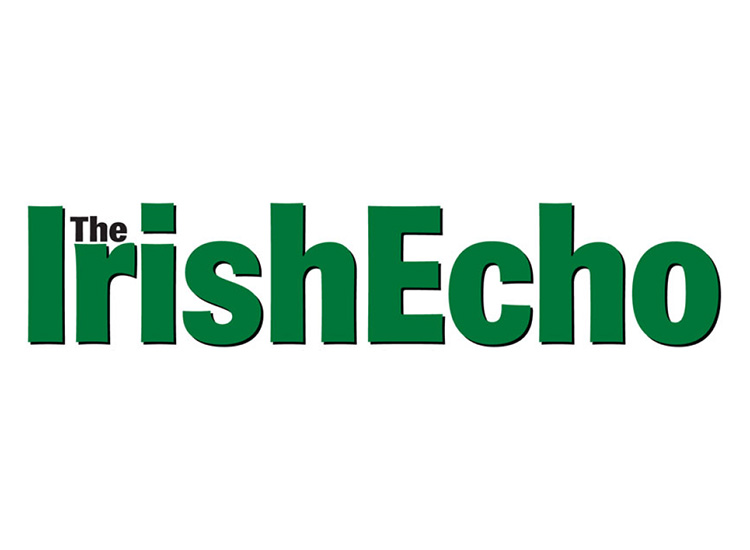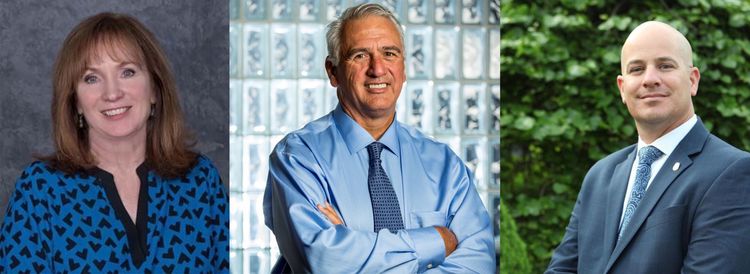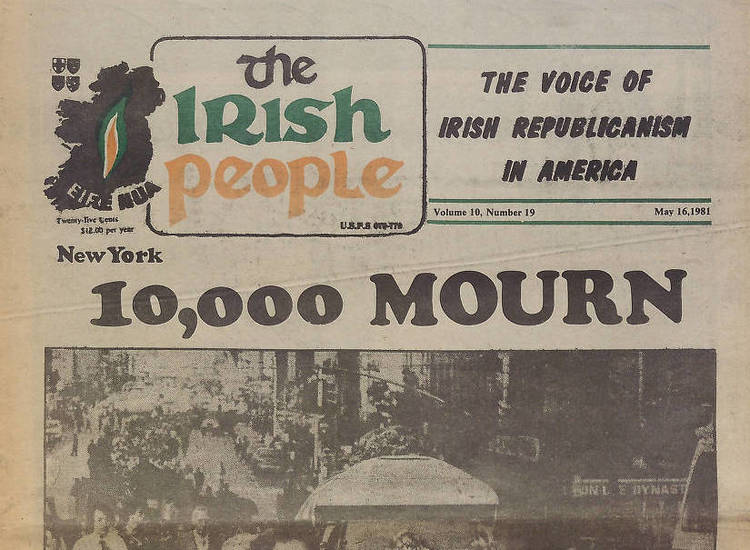Northern Ireland Secretary of State, Brandon Lewis, with an appropriate backdrop for a transatlantic interview.
By Ray O'Hanlon
It was a job with a familiar and well set brief. Then along came Covid-19.
Brandon Lewis is the Northern Ireland Secretary of State, the 22nd to hold an office that goes back to the first incumbent, William Whitelaw, in 1972.
Lewis was appointed to the Belfast post back in February, a month, as it turned out, that would be a fateful one, not just for Northern Ireland, the entire United Kingdom and the Republic of Ireland, but the entire world.
Lewis was named to succeed Julian Smith on Thursday, February 13. He landed in Belfast the following day.
The mysterious new virus was in the news by then. But it still seemed distant, more abstract than real.
That perception would soon change and be accompanied by a lockdown that has continued to one degree or another to the present day.
Lewis, as part of his new job, was ready and willing to criss cross Northern Ireland to meet anybody and everybody.
"I was very keen to engage and wanted to jump in feet first, talk to people and get an understanding," he said in an interview given the Echo last week.
The interview, as is just about always the case these days, was conducted via Zoom.
And together with phone conversations and video conferences this is how Secretary of State Lewis has been mostly conducting business over the last few months.
And the irony, he is quick to point out, is that "I have been talking to more people than would have been the case face to face."
What would have been foremost on Lewis' mind once he was appointed would have been the political climate in Belfast and, of course, the approaching departure of the United Kingdom, Northern Ireland included, from the European Union.
He was lucky on the first front.
As he put it: "I came in after the phenomenal effort of the parties and governments in getting Stormont up and running by means of the 'New Decade, New Approach' deal."
That deal was reached in January and just over a month before Lewis was appointed. It would be the template for a return to power sharing at Stormont.
Very quickly after his arrival in Belfast, however, matters would move away from what Lewis describes as "normal day to day business" to an "entirely Covid focus."
And this, he says, actually spurred on the five political parties engaged anew in power sharing to come together more strongly in order to focus on the health and safety of everybody.
A classic case, perhaps, of the cloud's silver lining.
Lewis sees power sharing as going "relatively well" and he is quick to praise First Minister Arlene Foster and Deputy First Minister Michelle O'Neill for working together for the health and safety of people across Northern Ireland, this in lieu of more typical politics.
"You have five parties," he says, "and they are going to disagree from time to time."
Now, as the summer slips towards autumn, the parties, he says, are having to look beyond Covid-19 to issues such as the economy, health and education.
"And that's where all five parties have to make sure they are working together. The structure of 'New Decade, New Approach' helps with that."
The leaders of the five parties, Lewis explains, come together at least once a month for a private conversation about where they are going.
"This is a good thing. The structure is there. New Decade, New Approach gives a good framework to have a more stable Executive going forward. Oddly enough, the difficulties of Covid have given them a way to work better, to put them in good stead going forward."
Going forward entails a rendezvous with two standouts at the end of the year and into 2021.
One of the them is the centenary of the Government of Ireland Act, which led to the partition of Ireland. The other is full Brexit, which, of course, was not what the majority of voters in Northern Ireland wanted back in the 2016 referendum.
The Secretary of State takes a decidedly positive view of an anniversary that will be viewed in a starkly contrasting way, depending on which side people stand on the existence of the border.
He sees the centenary as a "phenomenal opportunity" to highlight all the positive aspects of Northern Ireland as a standalone entity.
The centenary, he says, will be an opportunity to remind people around the world about the rich history of Northern Ireland, and to present it as a place for trade and investment.
Northern Ireland, he says, will be in a "unique position in the UK" - this after Brexit - and will be ready to advance in areas such as the creative arts, scientific research and green technology.
The centenary, he believes, will serve "to highlight what is so exciting about Northern Ireland and what a phenomenal place it is to come and visit."
He says: "When people come to Northern Ireland they find out how stunning it is, the breathtaking scenery around, for example, the Giant's Causeway."
So, Lewis concludes, the centenary stands as a moment "to respect and understand the past, but also an opportunity to celebrate the future of the people of Northern Ireland."
In addition, he says, there is also a wider connotation for the United Kingdom as the centenary will stand as "a celebration of the UK as we know it."
The known UK will be entering a new phase of its life with finalized Brexit.
Brexit has been the the source of much debate, boosting and angst, not least in Northern Ireland.
The Secretary of State, again, is eager to accentuate the positive and to ponder the future from the perspective of his government colleagues in London.
"There will be no new customs infrastructure in Northern Ireland whatsoever," he says.
As time passes, he sees Northern Ireland businesses benefit from being part of the UK and from trade deals with other countries such as theUnited States.
He is fulsome in his praise of U.S. companies operating in Northern Ireland, and also of Washington's special envoy to Northern Ireland, Mick Mulvaney.
"I have met Mick a few times, a couple of months ago in Washington, and also in London. We speak as well quite regularly.
"He is very keen to be supportive and helpful and is very conscious of the opportunity to drive and develop the economy in Northern Ireland. There's a big role he can play in that."
There are others with big roles to play.
Lewis is based in Hillsborough Castle outside Belfast and that was the recent venue for the first meeting of Micheál Martin in his role as Taoiseach, and British Prime Minister Boris Johnson.
"They worked well together. There was very positive chemistry," Lewis said of the two leaders.
"I'm looking forward to more working with the coalition government in Dublin, and with Micheál Martin. He's a very nice guy."
Six months into his tenure then, even with Covid, Brexit, and a centenary that will be viewed in more than one light by those living in Northern Ireland, Secretary of State Brandon Lewis would appear to take the view that things are proceeding, well, rather nicely, all things considered.









